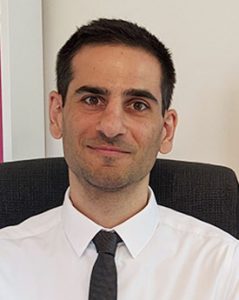 Welcome, Professor Andy Schofield,
Welcome, Professor Andy Schofield,
Professor Andy Schofield is the Vice-Chancellor of Lancaster University. As Vice-Chancellor he is the Chief Executive of the University and has overall responsibility for its operation and strategic direction. He took up the role on 1st May 2020.
Professor Schofield was previously Pro-Vice-Chancellor and Head of the College of Engineering at the University of Birmingham from 2015 until April 2020.
Andy is a theoretical physicist working in the area of condensed matter physics specialising in correlated electrons. He works closely with experimental groups who develop and study new materials using high precision techniques at low temperatures to understand how emergent properties like superconductivity, magnetism and novel metal behaviour arise.
Find out more about Professor Andy Schofield
 Conference Keynote, Dr David Sobral
Conference Keynote, Dr David Sobral
The sky is never the limit for curiosity-driven (UG) research
Where do we come from? What are we made of? For thousands of years these were met with answers focused on pleasant explanations that were able to stop us asking further questions. However, asking deep fundamental questions about us, the world and the Universe is fundamentally human and the true key to exploring what is above us.
While we naively think that only with multiple degrees, large sums of money and insanely big teams are we able to advance science and make discoveries, the reality is that all that is meaningless without our endless capacity and freedom to ask questions without needing an immediate answer. Excellent science can already be done even before University, and undergraduate students (UG) have some of the greatest potential to make truly breakthrough discoveries. In this talk, I will present and discuss some outstanding examples of scientific discoveries done by UG students in Physics and within the XGAL group (http://xgal.uk) during internships, group projects and Master’s projects. With discoveries ranging from studying fossil stars and globular clusters as old as the Universe in our own Milky Way, to finding and studying some of the most distant galaxies, the work from these students clearly shows that the sky is not the limit and that curiosity and perseverance are the keys to seeing the things that no-one saw before.
About David
I conduct a wide range of observations at various wavelengths and use the best telescopes in the world (and in space) in order to understand how galaxies like our own Milky-Way formed and evolved from the primitive Universe till today. See my research webpage. I discover and study some of the most distant, early galaxies and anyone can try to find distant galaxies with the same data that we use! Watch some of the videos explaining the research I do in my XGAL youtube channel. Most of my research is done by conducting and exploring some of the largest/widest narrow-band surveys ever done, particularly for sources with emission lines which result from either very hot, young stars, or super-massive black holes. Due to the uniform and self-consistent selection, galaxies found with the narrow-band technique across cosmic time are ideal to understand how they have changed across cosmic time, but also to conduct detailed follow-up studies that can really unveil the physics and nature of distant sources. See my Google Scholar page or my ADS list of all my publications and my CV here.
I provide a range of opportunities for students to experience and share state-of-the-art research, particularly by running the XGAL internships: https://xgalweb.wordpress.com. Since 2016, I have been able to take 3-5 students/year to observe in professional telescopes in La Palma: know more about it here. I also run the Astrophysics group project (PHYS369) in which students report on their research experiences and get their results published in our journal Notices of Lancaster University Astrophysics, NLUAstro (Freely available).
Find out more about Dr David Sobral
Closing & thanks, Professor Wendy Robinson

Professor Wendy Robinson is the PVC Education and is responsible for leading the University’s strategy for continuing to deliver an excellent transformative and innovative educational experience for all students and to ensure that the quality of the student experience remains at the heart of University activity.
Wendy joins Lancaster from the University of Exeter where she was PVC and Executive Dean of the College of Social Sciences and International Studies. She joined Exeter in 2006 as a Professor of Education, and held positions including Head of the Graduate School of Education, Associate Dean (Education) for the College of Social Sciences and International Studies and University Academic Dean for Students. Whilst at Exeter, Wendy led on important developments within the University, including serving on University Council, leading Exeter’s strategic review of postgraduate taught programmes, leading the Exeter Effective Learning Analytics Project, chairing the University Race Equality Group and Widening Participation Operations Board and, in the region, as Chair of the South West Academic Trust. Wendy was recently co-opted onto the UCAS Audit Committee and is a Principal Fellow of Advance HE.
Wendy achieved First Class Honours from the University of Cambridge, a Masters with Distinction from the University of London and then a PhD in the History of Education, again from Cambridge, before building her academic career at the Universities of Cambridge and Warwick. Wendy’s academic specialism is in the history of the development of the teaching profession, where her work has been influential around the world.
Find out more about Professor Wendy Robinson